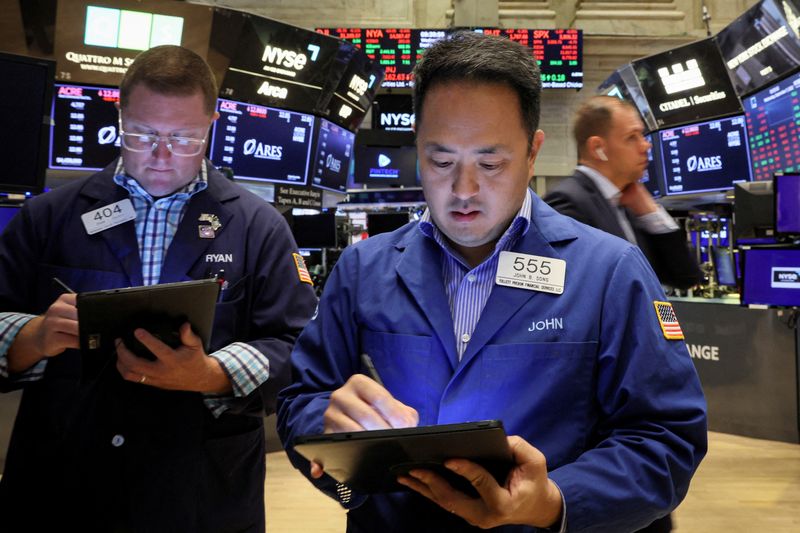By Lewis Krauskopf
NEW YORK (Reuters) - Expectations of more jumbo rate hikes from the Federal Reserve are pushing up real yields in the United States, putting pressure on everything from technology shares and meme stocks to bitcoin.
Yields on the 10-year Treasury Inflation-Protected Securities (TIPS) - also known as real yields because they strip out projected inflation - earlier this week stood at 0.88%, near their highest level since 2019. The yield has since ticked down to 0.84% but remains near three-month highs.
Essentially, real yields show how much an investor can make on an annualized basis holding a U.S. government bond. Negative real yields in early 2020 helped divert money from Treasuries into a broad array of comparatively risky assets, contributing to a rally in which the S&P 500 more than doubled from its post-pandemic lows.
This year, rising real yields have helped dull the allure of stocks. Real yields climbed back into positive territory in April, alongside a stock sell-off in which the S&P 500 posted its worst first-half performance in decades.
Stocks bounced as real yields dipped earlier in the summer. The recent rebound in real yields has coincided with an equities swoon that has seen the S&P 500 lose 7.6% from its mid-August high, with far sharper declines in assets such as the Ark Innovation ETF and meme stocks such as AMC Entertainment and GameStop (NYSE:GME).
Reflecting investors' waning enthusiasm for equities, BofA Securities clients sold a net $1.9 billion in stocks last week, notching the biggest outflows since June as the S&P 500 registered a 3.3% loss.
The total traded value in U.S. securities from retail investors -- who drove the meme-stock frenzy in 2021 -- has fallen to pre-Covid levels of around $11 billion a day, according to Vanda Research.
"Rising real yields are among the clearest expressions of tighter financial conditions and a core headwind for speculative assets that are dependent on excess liquidity," said Charlie McElligott, cross-asset strategist at Nomura Securities International.
GRAPHIC: Realyields vs stocks
Investors broadly expect the Fed - which is fighting the steepest inflation in four decades - to raise rates by another 75 basis points later this month, and many have pushed up forecasts for how high the central bank will raise rates next year, helping fuel the recent climb in bond yields.
Fed Chair Jerome Powell said on Thursday that the central bank is "strongly committed" to controlling inflation but there remains hope it can be done without the "very high social costs" involved in prior inflation fights.
With yields on the rise, "there is a little bit less enthusiasm to hold those equities until that risk/return tradeoff balances off a bit more,” said Yung-Yu Ma, chief investment strategist at BMO Wealth Management.
It's not all bad news for stocks. For now, the equity risk premium (ERP), which is the extra return investors expect to receive for holding stocks over risk-free government debt, is still in stocks' favor, according to Keith Lerner, co-chief investment officer at Truist Advisory Services. However, that comparison has become less favorable over the past couple of months.
"While the ERP is still at a level where stocks tend to outperform bonds on a 12-month basis, the Fed’s aggressive policy and earnings downgrades remain risks to the outlook," Lerner wrote in a recent note.
Rising yields weigh particularly on valuations of companies in the technology sector, which have high expected future earnings and are significant parts of indexes like the S&P 500. The tech sector has slumped over 11% since mid August.
Other corners of the market have also been hit as real yields have rebounded in recent weeks. Bitcoin, which has fallen sharply this year, is off over 20% from mid August, while prices for gold have dropped 5% in recent weeks. Although the precious metal is seen as a hedge against inflation, rising borrowing costs raise the opportunity cost of holding gold, which offers no yield.

Meanwhile, AMC and GameStop shares have both fallen about 40% over that period, while the ARK ETF has shed some 18%.
"There is less tolerance for more speculative tech in an environment where rates are going up quickly," said Kristina Hooper, chief global market strategist at Invesco.